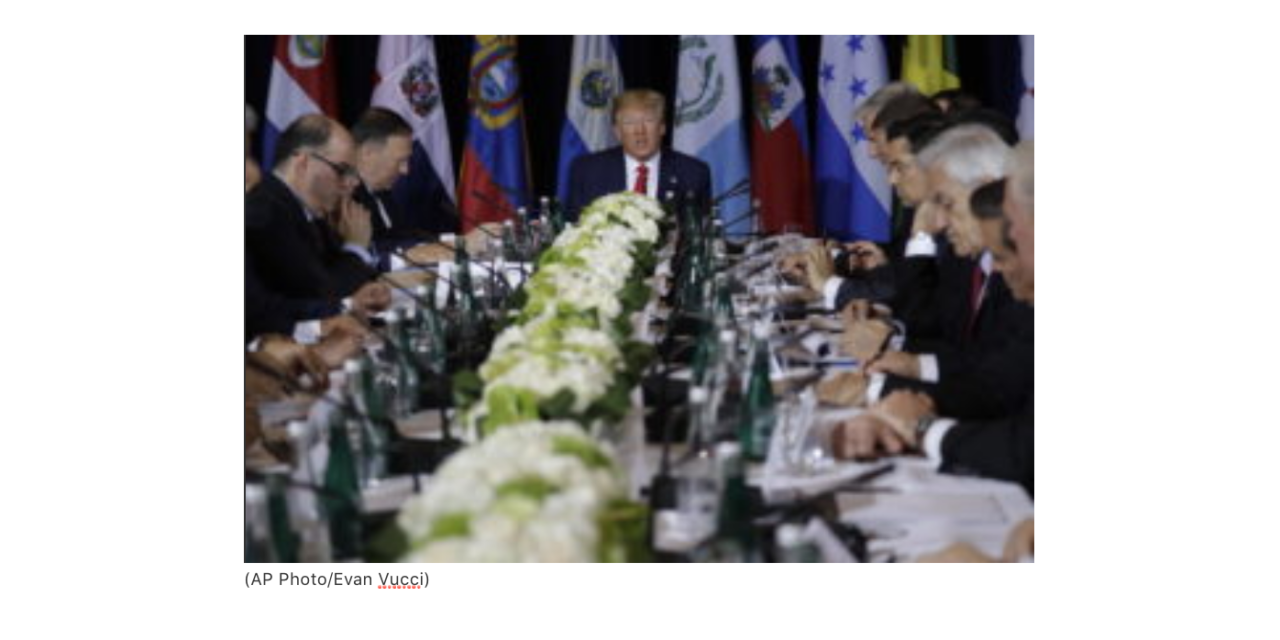The United Nations General Assembly in New York provided a new space for Venezuela’s parallel realities, with Nicolás Maduro and Juan Guaidó’s diplomats representing the country in competing spaces.
On Monday the Rio Treaty countries met and agreed to cooperate to levy sanctions on Venezuelan officials. Many Latin American countries do no have legal frameworks that permit sanctions against other governments, but presumably this type of international treaty would give them justification for doing so. Only Uruguay voted against the resolution and once it was approved, announced its withdrawal of the treaty, expressing its disapproval of what it called an “obsolete” and “inappropriate” use of the treaty.
U.S. President Donald Trump attended a parallel meeting with the Venezuelan opposition to express his support. Afterwards, the White House published an executive order restricting members of Maduro’s government and the armed forces from entering the U.S. The Trump administration also announced that it would channel $52 million in aid for pro-democracy work in Venezuela. The funding is aimed directly at Guaidó’s parallel government with money going towards travel expenses, training, and communication devices.
- In a joint statement about Venezuela, the International Contact Group and the Lima Group – expressed their support and faith to a peaceful transition that will lead to free and fair presidential elections.
- For its part the E.U. plans to sanction seven more Venezuelan officials over torture and other human rights abuses.
Maduro Exhibits Russian Ties
Maduro made a surprise visit to Russia, the fourth of his presidency (previous visits in 2013, 2015 and 2018). The objective seems to have been to show the world, during the United Nations General Assembly, that his government continues to have powerful allies. Putin expressed his backing, but did not promise any significant tangible aid. For Russia, Venezuela has become a place where it can export its grains, sell its weapons, and benefit from the country’s natural resources. As Sputnik reported, Russia’s investment in Venezuelan mining projects could reach $1 billion, as there is a great interest in producing diamonds and gold.
- US and European leaders tried to downplay the significance of Maduro’s visits. Special Representative for Venezuela, Elliott Abrams, said that Russia has maintained communication with members of the Venezuelan opposition as a way of “hedging their bets.”
- Juan Pablo de La Iglesia Spain’s Secretary of State for International Cooperation, Ibero-America and the Caribbean, said that Russia could play a constructive role, softening Maduro’s position.
Negotiations
The new round of negotiations between minority opposition parties and the Maduro government (see the last issue of the Venezuela Weekly), has been praised by some stake-holders, provoked the rejection of others and confused still others.
- In a joint statement, Mexico and Uruguay pointed out that negotiations and dialogue are the only acceptable way to achieve a peaceful solution to the Venezuelan crisis (see Spanish original here). They welcomed the release from jail of Edgard Zambrano, and asked the government to release more political prisoners.
- For its part, the International Contact Group issued a statement that “expressed their concern at the temporary suspension of the Oslo facilitated talks and urged the parties to return to inclusive, credible and serious negotiations on the basis of the previously agreed agenda.” They suggested the new talks do not meet these standards.
- The Inter-American Dialogue published a Q&A regarding the new negotiations with a variety of responses.
National Assembly
- After last week’s agreement with five small opposition parties, the Maduro government announced the release of National Assembly Vice President Edgar Zambrano. The politician had been detained since May after the failed uprising attempted by the opposition.
- Socialist party deputies took their seats in the National Assembly.
Armed Forces
- In a recent brief, the International Crisis Group (CG) analyses Venezuela’s armed forces and their political role. The report argues that they need to be part of any political negotiation process and should commit to the country’s stabilization.
Colombia
- The CG also released a brief that examines recent developments in Colombia after dissident FARC factions decided to return to the armed struggle, a situation with significant negative implications on Colombo-Venezuelan relations. The CG recommends the two parties “establish communication channels to mitigate the risk of misunderstandings over border violence.”
Migration
In an international forum during the United Nations General Assembly with the countries that are most affected by the Venezuelan crisis, Eduardo Stein the special representative for Venezuela, of the United Nations Agency for Refugees (UNHCR) and the International Organization for Migration, called on the host countries to maintain “flexible approaches” to Venezuelans’ entry in their territories. Stein also called on countries in the region to continue coordinating and sharing responsibilities under the Quito Process.
- For its part Colombia asked Peru and Ecuador to scrap their recent visa requirements for Venezuelans and open their borders.
- The European Union (E.U.) together with UNHCR and the International Organization for Migration will hold an International Solidarity Conference on Venezuelan Refugee and Migrant Crisis in Brussels at the end of October.
- The push for Temporary Protected Status for Venezuelans has stalled in the U.S. Senate.
Freedom of Speech
- Venezuela’s intelligence police arbitrary detained a graphics worker, José Guillermo Mendoza, for transporting material indicated as “subversive” (the material related to a punk music album cover produced by human rights group PROVEA). Local and international organizations mobilized demanding Mendoza’s immediate liberation, and he was set free after 24 hours without any charges against him.
Violence
- Human Rights Watch released a report showing that the National Police’s Special Actions Force (FAES) continues to engage in serious human rights violations with impunity.


